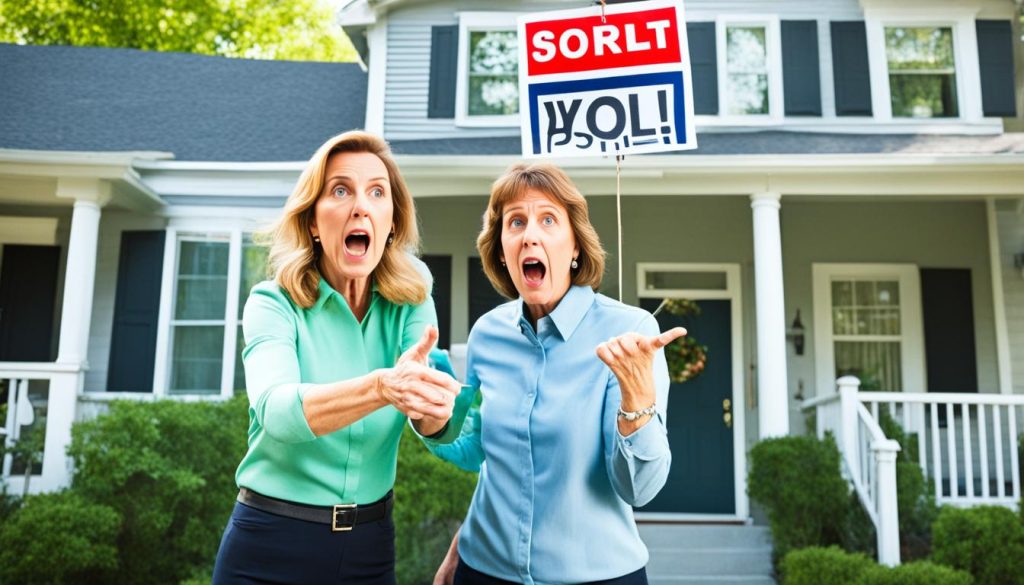Forcing a house sale in the UK can seem daunting but is sometimes necessary. This article looks at when you might need to make someone sell their home. Situations like divorce, paying off debts, or dealing with inherited properties might lead to a forced sale.
Deciding to force a sale is serious, as it means going through legal steps and considering others’ interests. Yet, it might be the best way to settle debts, share assets, or solve big disputes. Knowing when and how you can force a sale is key to making the right choice.
What Circumstances Can You Force a House Sale UK?
You can force a house sale in the UK under certain conditions. These include paying off creditors, inheriting a property, or dealing with divorce disputes. It’s vital to know the legal steps and grounds for a sale if you’re a homeowner, co-owner, or dealing with inheritance or debt issues.
Paying off Creditors to Force a Sale
If you have debts and creditors get a judgement against you, they might put a charging order on your home. Then, they can ask the court to sell the house. The court must agree before the sale can happen. The sale money goes to pay off the debt, and any left over belongs to you.
This method, known as a court order UK, helps creditors get back what they’re owed by selling your property. The court makes sure selling the house is the right step to settle the debt before giving the order.
Forcing a Sale After Inheriting a Willed Property
When you inherit a property, it can lead to disagreements among heirs or issues with creditors. The courts might order the sale of the property to settle disputes or pay off debts. This happens when heirs can’t agree on the property’s future or if creditors want to collect what’s owed.
The probate property sale UK process lets the courts step in and force the sale of the inherited property. This ensures the estate is divided fairly or debts are paid. Dealing with this legal process can be tricky, so getting professional advice is a good idea for a forced sale after inheritance.

Forcing a House Sale in a Divorce
If you’re going through a divorce in the UK, you might need to sell the family home and split the money. This is called a “forced sale” and can be tough for couples. Reasons for selling include not being able to pay the mortgage alone, your partner not wanting to sell, needing expensive repairs, or the property’s value dropping.
Reasons to Consider Forcing a Sale After Divorce
- Inability to afford the mortgage payments on your own
- Spouse’s non-cooperation with the sale
- Need for major repairs that neither of you can afford
- Property located in a declining market
Court Considerations for Forcing a Sale in Divorce
In the UK, the courts have a big role in forcing a house sale during a divorce. They can order a sale if the couple can’t agree. About 15-20% of divorce cases involve fights over selling a shared property.
The courts look at several things before deciding to force a sale. They think about the children or dependents living there, the couple’s money situation, and how it will affect their homes. If kids under 18 or elderly or disabled dependents live there, the court usually waits until they find new homes.
If you ignore a court order to sell your house during a divorce, you could face serious trouble. This includes jail time, fines, or both in about 10% of cases.
| Statistic | Value |
|---|---|
| Around 50% of divorcing couples in the UK are named on the title of the property they share. | 50% |
| Only a court can make an order to sell the property when the divorcing parties can’t agree on a joint sale. | 100% |
| Roughly 15-20% of divorce cases involve disputes over selling jointly-owned property. | 15-20% |
| Women are more likely than men to initiate divorce proceedings that involve discussions around property sales. | More likely |
| In cases where children under 18 or elderly or disabled dependents live in the property, approximately 70% of courts suspend the order for a property sale until suitable accommodation arrangements can be made. | 70% |
| Less than 5% of divorce cases result in a court ordering a partition of the co-owned property as a solution to the sale disagreement. | Less than 5% |
| Failure to comply with court orders to force a house sale during a divorce can lead to imprisonment, fines, or both in approximately 10% of cases. | 10% |

Investment Properties and Life Estates
Investing in property can be profitable but comes with risks. If a property doesn’t meet your goals, you might want to sell it. The same goes for life estates, where you can sell if upkeep costs or damage are too much.
There are several reasons to force a sale of an investment property. Maybe it’s not earning enough rent, or upkeep costs are too high. Or, the area’s property values have dropped, making it a bad investment. In these cases, selling might help you get your money back and find better opportunities.
Life estates also have situations where selling is necessary. High maintenance costs, like taxes and repairs, can be overwhelming. Or, if the property is in poor condition and not being fixed, selling is the best way to protect its value.
Forced sales of these properties are complex and need legal advice. It’s important to work with experts like real estate lawyers or financial advisors. They can help you understand the process and protect your rights.

In the UK, property and investment are key to personal wealth. Knowing when you can force a house sale is crucial. This knowledge helps property owners make smart choices and protect their investments or manage life estates effectively.
Other Circumstances for Forcing a Sale
Dealing with property ownership can sometimes lead to situations where forcing a sale is needed. Let’s look at some key reasons why homeowners or co-owners might want to sell their property by force in the UK.
Tenants in Common Disagreements
If you’re a tenant in common with others and can’t agree on selling the property, you might need to force a sale through court. This process is tough, but the law helps solve disputes when owners can’t agree.
Property Liens and Encumbrances
Property liens or encumbrances, like unpaid taxes or repairs, can lead to a forced sale. If these issues don’t get fixed and the owners don’t act, courts might step in. They sell the property to clear the issues for a new owner.
Tenant’s Right of First Refusal
Sometimes, a tenant has the right to buy the property first when the landlord wants to sell. This means the tenant gets to buy it before others. If they don’t buy it, the landlord can sell it to someone else.
Dealing with forced property sales is tough, but knowing the legal options helps. Whether it’s solving disputes between tenants, dealing with property issues, or using a tenant’s right of first refusal, getting professional advice is wise. It ensures a successful outcome.

Conclusion
In conclusion, you can force a house sale in the UK under certain conditions, even if the owner doesn’t want to sell. Common reasons include divorce, debt, inheriting property, issues with investment properties, or disputes among tenants. The process involves applying for a court order, which can be complex and take a long time.
The court will only approve a sale if it’s seen as best for everyone. It’s crucial to talk to legal experts to know your rights and options before starting the process. They can guide you through the legal steps.
Forced sales can happen in situations like a divorce standoff or when debts need paying. But, the court looks at each case carefully before making a decision. They aim to make sure everyone’s rights are respected and the outcome is fair.
FAQ
How can you force a house sale to pay off creditors?
If you owe money and a creditor gets a judgment against you, they can put a charging order on your home. Then, they can ask the court to sell the house. The court must agree before the sale can happen.
Can you force a sale after inheriting a willed property?
Yes, you can force the sale of an inherited property if upkeep costs are too high or if repairs are not done. This can be done if the property is in poor condition.
What reasons might someone consider forcing a house sale after a divorce?
Reasons for selling a house after divorce include not being able to afford mortgage payments alone, your ex not helping with the sale, or needing expensive repairs. Another reason is if the property’s value is dropping.
What issues with investment properties or life estates could lead to a forced sale?
You might sell an investment property if it’s not doing well or if you want to leave the investment world. With a life estate, you can sell if upkeep costs are too high or if repairs are ignored.
When can you force a sale due to disagreements between tenants in common?
If you and other tenants in common can’t agree on selling, you might force a sale through court.






